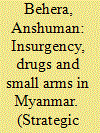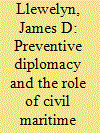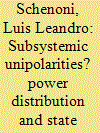|
|
|
Sort Order |
|
|
|
Items / Page
|
|
|
|
|
|
|
| Srl | Item |
| 1 |
ID:
148960


|
|
|
|
|
| Summary/Abstract |
The stunning British vote of June 24, 2016, to quit the European Union (EU)—dubbed Brexit—has triggered a major realignment of economic and political forces across the globe, strengthening the template of a new world order tilted towards Moscow, Beijing and the rising powers of Asia and Africa. As Washington nervously recognizes, there will be a decline in the influence of the US, EU and North Atlantic Treaty Organization (NATO), the latter two having served as instruments of US global domination.
|
|
|
|
|
|
|
|
|
|
|
|
|
|
|
|
| 2 |
ID:
148959


|
|
|
|
|
| Summary/Abstract |
For the last 15 years, the war in Afghanistan has caused hundreds of thousands of deaths and the United States has sent thousands of troops and spent billions of dollars supporting strategies that have been unable to curtail the violence in the country. In addition to deploying over 130,000 troops from 51 North Atlantic Treaty Organization (NATO) countries and its partner nations, the United States alone spent over $686 billion in the ‘Afghan war’.
|
|
|
|
|
|
|
|
|
|
|
|
|
|
|
|
| 3 |
ID:
148956


|
|
|
|
|
| Summary/Abstract |
One of the campaign promises of President Muhammadu Buhari was that he would eliminate Boko Haram six months after assumption of office. By December 2015, the Buhari-led government gave itself a pass mark for countering the terrorists. The government declared that the group had been ‘technically defeated’. This declaration has led to debates in the public space as to the veracity of this claim. This article aims to critically appraise the on-going attempt to eliminate the Boko Haram threat under the Buhari administration. The author questions whether we can actually conclude that the anti-Boko Haram war has really been won. The article analytically demonstrates that Boko Haram continues to pose a threat to Nigeria and the West African sub-region, contrary to claims that it has been defeated.
|
|
|
|
|
|
|
|
|
|
|
|
|
|
|
|
| 4 |
ID:
148954


|
|
|
|
|
| Summary/Abstract |
The many links between drugs, small arms and insurgency have been widely discussed and addressed by scholars. The literature in particular has convincingly shown how several insurgent groups in Myanmar have used the drug business to finance and sustain their violent movements. Funds generated from drug production and circulation help the insurgent groups to procure arms, and are widely believed to be supporting the protracted nature of these movements. In this context, Myanmar presents itself as a classic example wherein the relationship between drugs, small arms and insurgency becomes clearly apparent. The country has become a major hub for illicit drugs production. It has been observed that insurgency, arms smuggling and illicit drugs business depend heavily on each other for their sustenance. The ‘ungoverned territories’ bordering other states also help insurgencies and keep the drug business flourishing. Given this context, this article focuses on unravelling the linkages among insurgency, drugs and small arms in Myanmar.
|
|
|
|
|
|
|
|
|
|
|
|
|
|
|
|
| 5 |
ID:
148955


|
|
|
|
|
| Summary/Abstract |
Southeast Asia’s international shipping lanes (ISL) are essential to the economic security of the Asia-Pacific region. Maintaining good order at sea serves to protect regional trade and can be achieved through collaboration between civil maritime security agencies (coast guards). Japan and China both have significant coast guard capabilities and diplomatic influence in the region that could be harnessed to promote civil maritime security cooperation with the countries of the Association of Southeast Asian Nations (ASEAN). With regional tensions rising over disputed waters in Southeast Asia, ‘white hull diplomacy’ would seem to be a timely option for governments to consider in search of an intra-Asian de-escalation process.
|
|
|
|
|
|
|
|
|
|
|
|
|
|
|
|
| 6 |
ID:
148952


|
|
|
|
|
| Summary/Abstract |
This article has two parts. The first part aims at analysing why nations are increasingly going beyond their multilateral and regional moorings to secure and advance their national interests. In doing so, why and how do they indulge in sub-regional engagements? It has been empirically seen across the board in almost every part of the world that sub-regional growth initiatives play a significant role in regional integration. The second part, by drawing from the above broad conceptualization in South Asia, uses the Bangladesh–Bhutan–India–Nepal Motor Vehicles Agreement (BBIN MVA) as a case study.
|
|
|
|
|
|
|
|
|
|
|
|
|
|
|
|
| 7 |
ID:
148957


|
|
|
|
|
| Summary/Abstract |
This article explores the possibility of conceiving South America and Southern Africa as subsystemic unipolarities under Brazilian and South African primacy, respectively. It argues that this concept, when applied to these regions, sheds light not only on the long-term strategies behind the Brazilian and South African foreign policies towards their neighbourhood, but also on the behaviour of secondary regional powers and small states. This hypothesis questions the maxim that considerations related to polarity affect great powers only. After examining the Brazilian and South African cases, the author undertakes a comparative analysis of 17 countries in these regions, showing that the behaviour of politically stable countries in these regions is as predicted by theories of unipolarity.
|
|
|
|
|
|
|
|
|
|
|
|
|
|
|
|
| 8 |
ID:
148953


|
|
|
|
|
| Summary/Abstract |
China’s aggressive rise and strained relations with its Asia-Pacific neighbours—a region with immense economic and strategic potential—have forced the US to forge a strategy of Asian rebalance. Besides making China suspicious, this strategy has aroused the possibility of a new cold war. In contrast, though India’s relations with China have improved considerably since the 1962 War, the unresolved border issue and the threatening Chinese attitude do not allow India to trust China. To deal with the Chinese threat, India has devised a Look East, Act East engagement policy as well as developed close economic and strategic relations with the US and its Asia-Pacific allies. Although the concern of strategic autonomy deters India from being an active partner of US strategy, China’s all-weather friendship with Pakistan and encirclement through infrastructure in its neighbourhood as well as Xi Jinping’s Chinese dream have left limited options for India. Therefore, this article aims to analyse the implications of US re-involvement in the Asia-Pacific and India’s role therein—particularly its concerns regarding this strategy.
|
|
|
|
|
|
|
|
|
|
|
|
|
|
|
|
| 9 |
ID:
148958


|
|
|
|
|
| Summary/Abstract |
Over the last decade we have seen a race to build ports in the Indian Ocean as the two Asian powerhouses, China and India, compete to assert their regional influence. The newest addition to this power struggle is the Chabahar Port, located in Chabahar, a coastal town in the Sistan–Baluchistan region in south-eastern Iran, next to the Gulf of Oman, and at the mouth of the Strait of Hormuz (Figure 1). Its strategic importance and economic value have drawn attention from many countries; however, India was the quickest to secure a deal to develop the port.
|
|
|
|
|
|
|
|
|
|
|
|
|
|
|
|
|
|
|
|
|